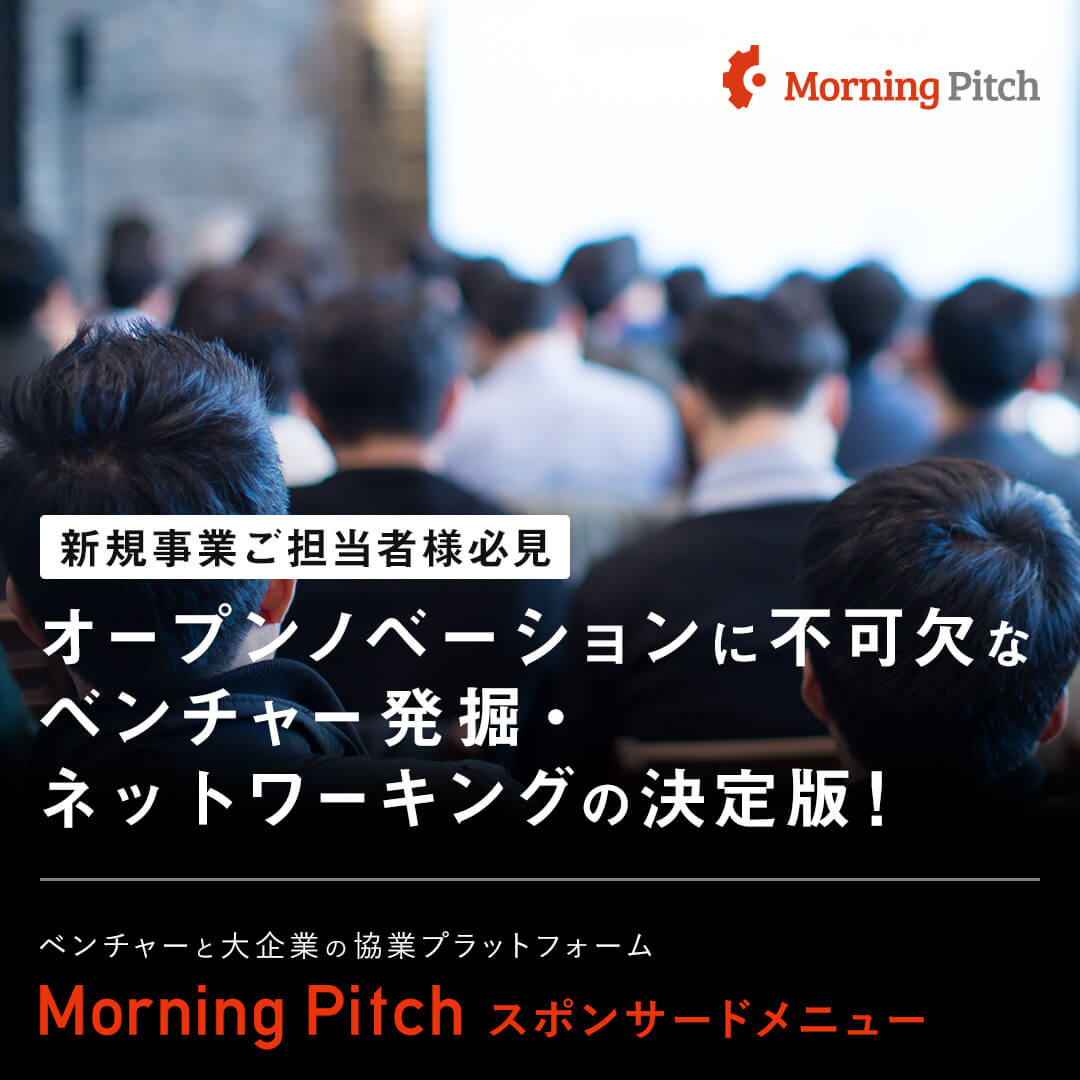イノベーショントレンド
【観光・レジャー特集】インバウンド各の急増に伴い、量だけではなく質も重視。サステナブルツーリズムは新たな観光戦略の切り札
\イノベーショントレンド解説/
この連載ではモーニングピッチ各回で取り上げたテーマと登壇ベンチャーを紹介し、日本のイノベーションに資する情報を発信します。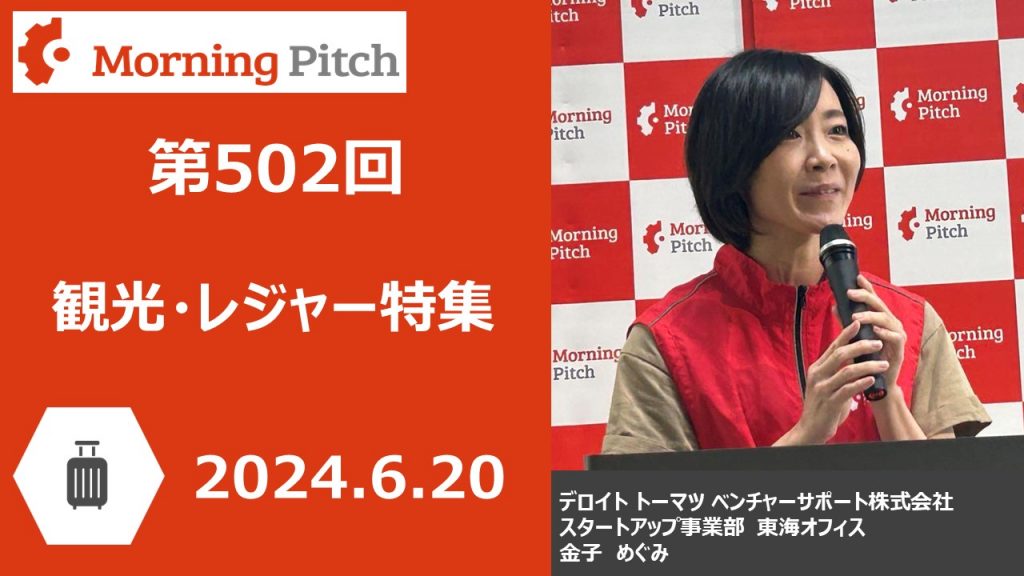
今回は、6 月20 日に開催した「観光・レジャー特集」です。
2030年までにインバウンド客数は5000万人へ
コロナ禍によって大きく落ち込んだ国内の観光・レジャー業界は、需要が急速に回復しています。インバウンド(訪日外国人)客数は単月で300万人台に突入しており、円安の影響によって消費額も増えています。
2023年に策定された観光立国推進基本計画では、インバウンド市場を拡大するため、25年に向けて①訪日外国人の数は3200万人②旅行消費額は6兆円③消費単価は20万円―という戦略を掲げましたが、①と②はそれぞれ2023年中に前倒しで達成しました。
現状のペースを踏まえると2030年までにインバウンド客数は5000万人、旅行消費額は9兆円まで拡大することが予測されています。
また、日本は観光したい国として、全世界的に注目されつつあります。日本政策投資銀行が2023年に実施した「次に観光したい国ランキング」調査によると、トップは日本で、回答率は55%。自然や史跡、歴史的建造物が評価され、2位の韓国を25ポイントも上回りました。世界的に注目されることによって旅行者のバックグラウンドは多様化が進み、インバウンドビジネスの商機もさらに活発になることが見込まれます。
オーバーツーリズム問題が深刻化
一方、インバウンド需要の急増に伴い、自然・景観の破損や混雑・渋滞、ごみの散乱などオーバーツーリズム(観光公害)にまつわる問題が改めて注目されるようになっています。この問題は観光地や観光地に居住する住民への影響にとどまらず、「満足度が低下する」として観光客にも影響が及んでいます。このような背景を踏まえ、観光の量的な拡大を目指す一方で、質も重視した取り組みが強く求められています。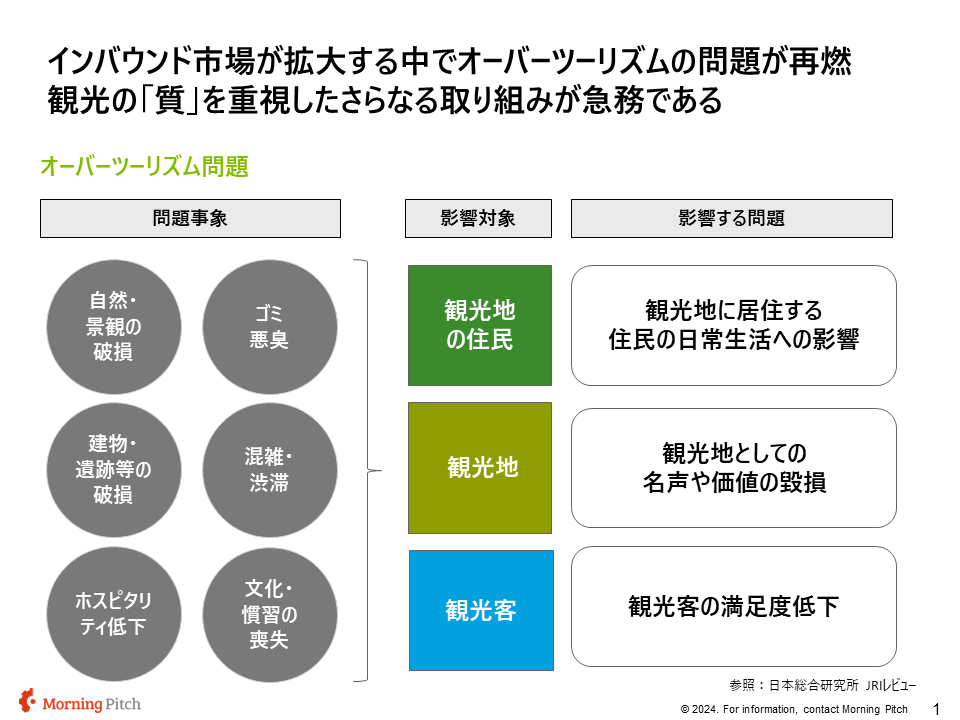
質を重視した新しい観光の在り方として、世界的に注目されているのがサステナブルツーリズム(持続可能な観光)です。観光市場を形成する全てのステークホルダーが、経済・環境・社会への影響を主体的かつ長期的に配慮することを指し、SDGs(持続可能な開発目標)の推進に重要な役割を果たしています。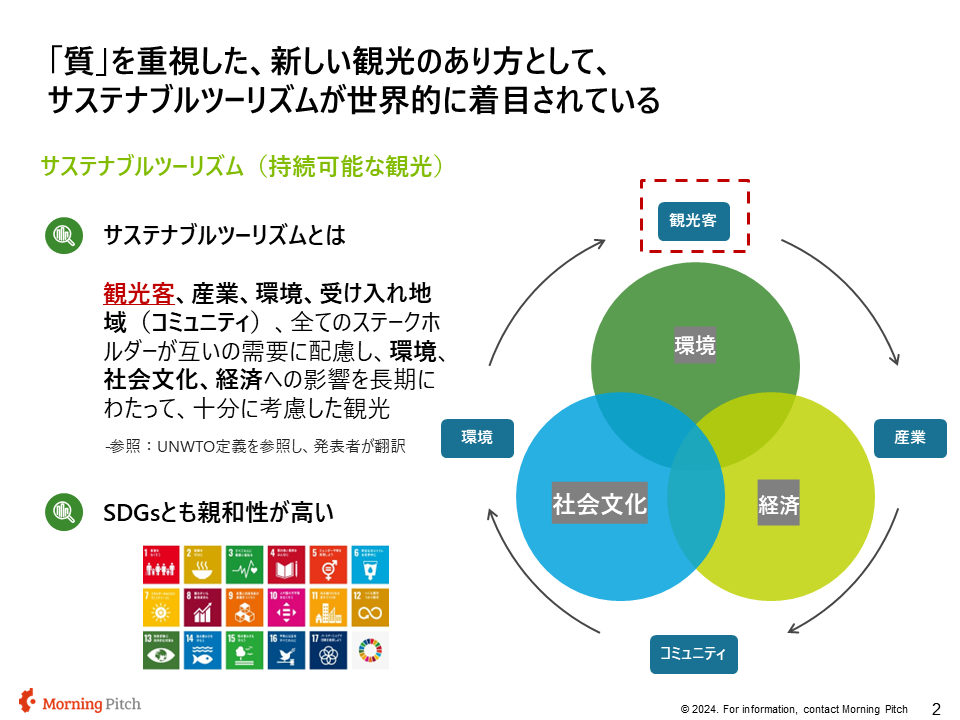
サステナブルツーリズムを推進するには、観光客にとって有意義かつ満足度が高い体験を提供することで、持続可能性の問題に対する意識を高めることが必要です。満足度を高めるには魅力的なコンテンツの提供が不可欠で、①自然・伝統文化体験②イマ―シブ(没入)体験③地域の日常体験―に対する関心が世界的に高まっています。3つの観光コンテンツについては、観光客への訴求ポイントを明確にすることが必要です。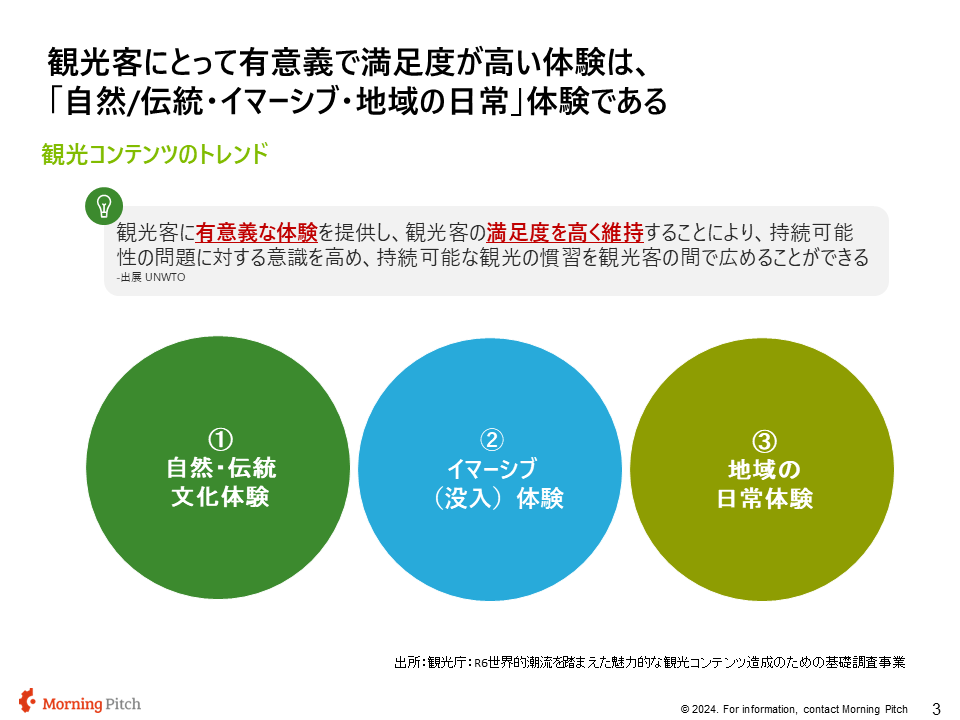
自然・伝統文化体験の場合は本物と特別感、イマ―シブ体験であればストーリー性とシームレス、地域の日常体験だとコミュニティ、パーソナライズがポイントとなります。
こうしたポイントにフィットするスタートアップのサービスや製品を掛け合わせれば、新たなサステナブルツーリズム市場の可能性が、大いに広がると考えられます。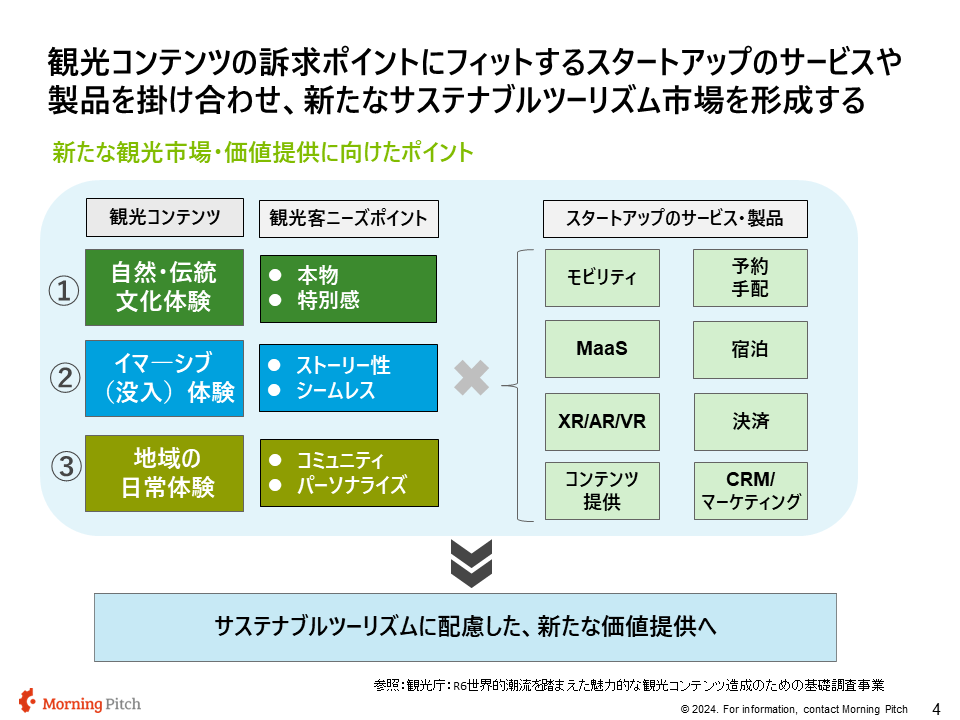
自然・伝統文化やイマ―シブを体験できるサービスが続々と登場
サステナブルツーリズムに取り組むスタートアップも相次いで登場しています。自然・伝統文化体験の一つは岩谷(いわや)技研が目指す気球による宇宙遊覧フライト。訓練や鍛錬を必要とせず、幼児から年配者に至る全ての人を宇宙の入り口まで連れて行くことがミッションです。
中国地方のテレビ局はイマーシブ体験を実現するため、ビーライズと提携。現実と仮想空間を融合するクロスリアリティー(XR)を主体としたデジタル体験コンテンツを提供しています。東京の大手私鉄会社は、ユーザーの嗜好に基づきシームレスにおすすめの場所を紹介するRelyon Trip(リリオントリップ)の旅行計画アプリを提供しています。
地域の日常体験で代表的な事例は、民泊仲介大手の百戦錬磨が展開している、地域の暮らしの体験が可能な宿泊サービス。求人サイトのSAGOJOは、地域活性化に貢献したい 旅人と地域をマッチングする人材プラットフォームサービスを運営しています。
観光・レジャー分野のスタートアップは予約/手配、宿泊、コンテンツ提供、決済・キャッシュレス、AR/VR・XR、モビリティ、MaaS、CRM/マーケティングという8つの領域に属しています。その中から今回は5社を紹介します。
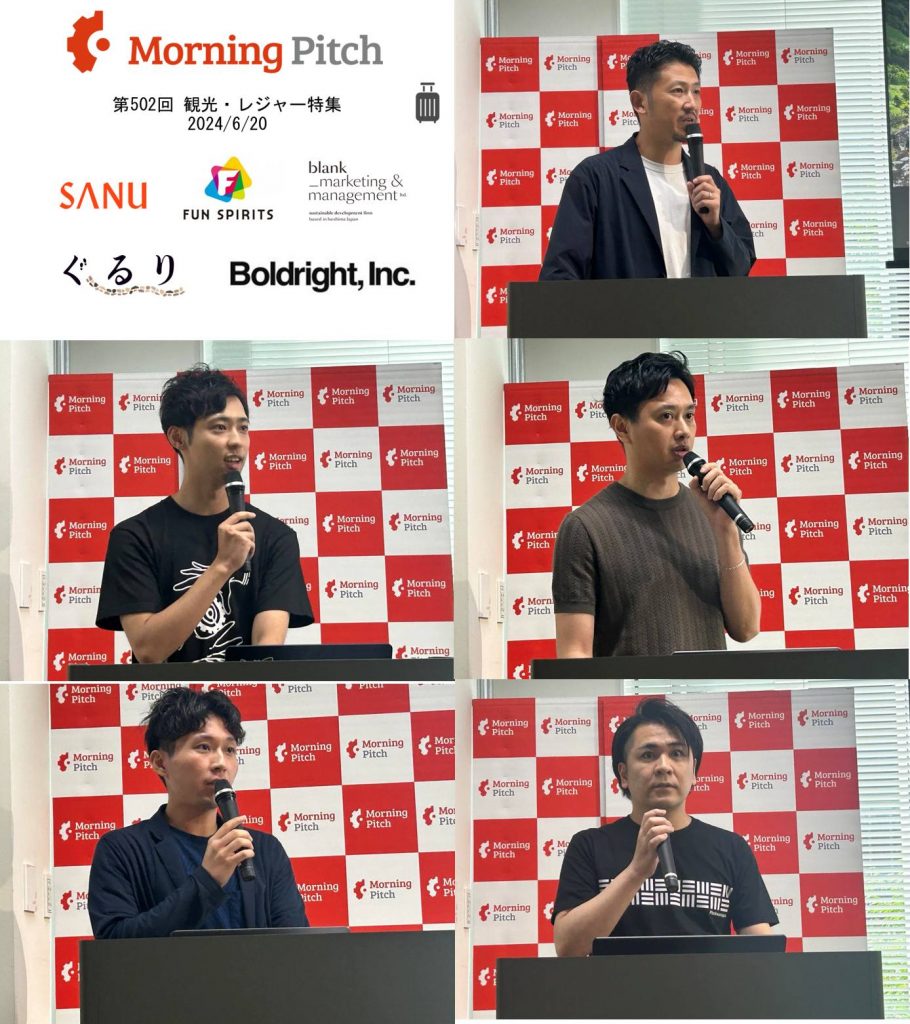
メンバーシップ制セカンドホームで都市と自然を軽やかに行き来(株式会社Sanu)
Sanu(サヌ)は都市と自然を軽やかに行き来するライフスタイルを提案する、メンバーシップ制セカンドホームサービス「SANU 2nd Home」を提供しています。6月の時点で都市から1~3時間の自然立地に20拠点102室を運営しています。貸別荘市場はグローバルで22兆円。ホテルを大きく上回っていますが、日本の別荘保有率は0.6%と欧米に比べ圧倒的に小さく、市場が大きく拡大する余地があります。2025年にかけて北はニセコ、南は奄美大島まで、30拠点200室へと拡大する予定です。
謎解きを基軸に観光資源の開発や集客支援を行う(FUN SPIRITS株式会社)
FUN SPIRITS(ファンスピリッツ)は、謎解きを基軸とした観光資源の開発や集客支援、地域プロモーションを手掛けています。謎解き×地域活性を明確な軸とし、豊富なクリエイターによるコンテンツの多様さに加え、短納期でローンチができる点で差別化。局所的な単発のイベントにとどまらず、ユーザーが広域を周遊するような仕掛けがあり、地域の魅力発見を含めた体験が可能です。これまでに累計40地域以上約8万人を超える参加者が謎解きを通して地域の魅力を体験しており、今後は全都道府県での開催を目指します。
スケジューリング・手配を自動で行う富裕層向けアプリケーション(株式会社Blank Marketing&Management)
Blank Marketing&Management(ブランクマーケティングアンドマネジメント)は、富裕層に特化したトラベルアプリケーションを提供しています。スケジューリング・手配を自動で行うシステムを通じ、宿泊先を探し手配するといった一連の課題を解決、ストレスの軽減を図ります。航空会社のCA出身者が多く導入サポートが充実しており、短期的にはラグジュアリーホテルを中心にサービスを展開。1施設あたり、売上高2億円を目標に10~15施設の獲得を計画しています。
歴史コンテンツに特化した位置情報型音声ガイド(株式会社ぐるり)
ぐるりは歴史好きな中野代表が大学時代に起業した、横浜国立大発のベンチャーで、歴史コンテンツに特化した位置情報型音声ガイド・情報プラットフォーム「GURURI」を運営しています。城郭や寺社仏閣などに特化してイラストマップ上に集約し、ユーザーはそこで美術館のような音声ガイドや投稿機能、訪れた史跡のログの取得が可能です。エリアごとでなく、歴史上の人物や出来事などにちなんだコンテンツの制作まで行うことによって、テーマ型の周遊を促進するのが特徴です。
特定エリアや地域経済圏に閉じたオリジナル地図を誰もが簡単に作り運用(ボールドライト株式会社)
ボールドライトはデジタルマップ技術を軸とした、観光DXプラットフォーム「プラチナマップ」と、商業施設DXプラットフォーム「プラチナモール」を開発・提供しています。特定エリアや地域経済圏に閉じたオリジナル地図を誰もが簡単に作り運用することができます。マップ上では混雑情報、MaaS連携、スタンプラリー、クーポン、音声ガイドなど、位置情報と連携する多様なサービスをワンストップで提供。プラットフォーム事業を通じ、空間・人・消費をシームレスにつないでいきます。
2024年のインバウンド客数は大幅に増え、これまでの最高記録である19年の3188万人を更新する勢いです。こうした中、政府は数だけではなく質を追求する戦略を推進しているため、特にサステナブルツーリズム系スタートアップに対する注目度は高まりそうです。
▼テーマリーダーProfile

デロイト トーマツ ベンチャーサポート株式会社
スタートアップ事業部
金子 めぐみ(かねこ めぐみ)
大手事業会社2社(教育・観光分野)において、日本の地域活性化に向けた企画・ブランディング・マーケティング支援を行う。また、政府系機関2機関において、途上国の地方部におけるビジネス構築支援やビジネス人材教育にかかるプロジェクトに従事。現職では、東海圏を中心とした、スタートアップの伴走支援、自治体のエコシステム形成やスタートアップ・自治体・企業との協業創出支援に従事。
~イノベーショントレンドを定期的にキャッチアップされたい方へ~
—————————————————————————————————————————————-
Morning Pitchでは、上記のような各回テーマ概観の解説を
資料や動画にして有料会員様限定でお届けしています
解説資料・・・Morning Pitch有料会員
解説動画・・・Morning Pitch Innovation Community(MPIC)会員
—————————————————————————————————————————————-

